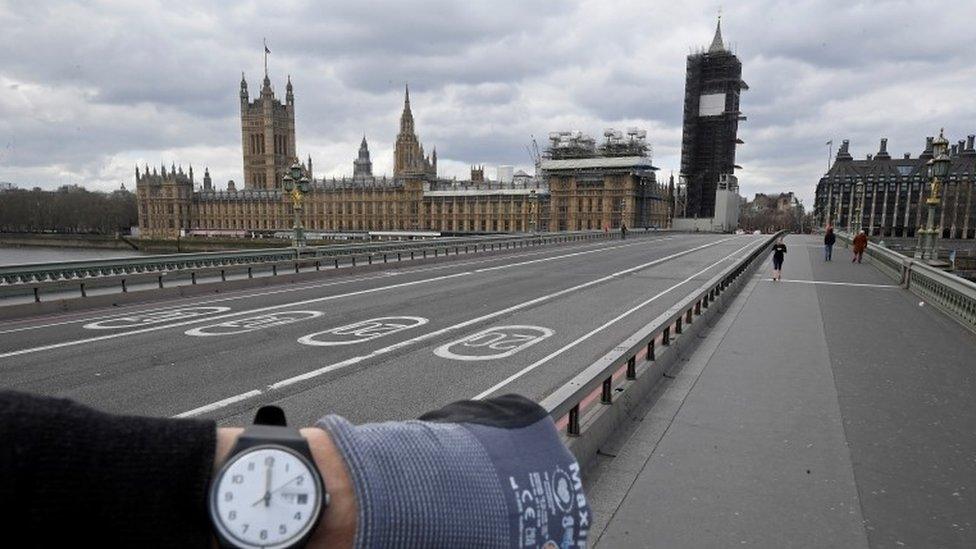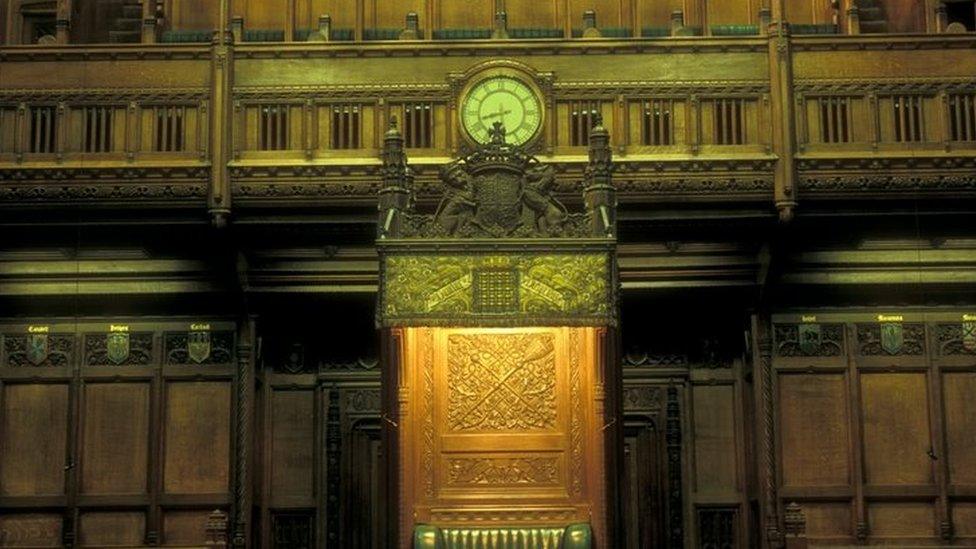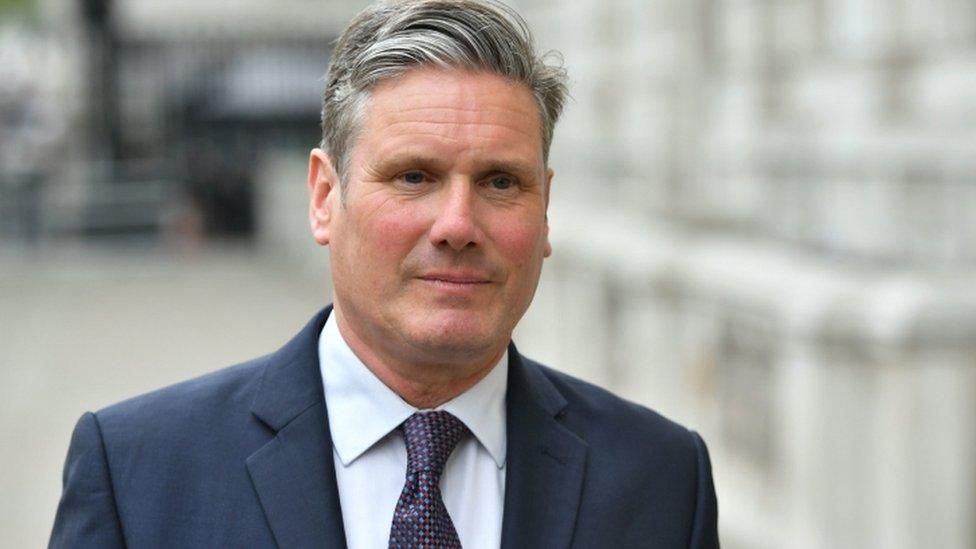Week ahead in Parliament: Preparing for strange new world
- Published

PMQs is still due to take place at mid-day on Wednesday
It's Parliament, Jim, but not as we know it....
Out goes the published Commons agenda and out go the familiar ways of Westminster. When Honourable Members and Noble Lords return to their chambers on Tuesday, for a truncated week, it will be to hybrid Houses allowing participation online as well as by those physically present.
And there won't be many physically seated on the red or green benches - a maximum of 50 in either chamber, with rigorous requirement for social distancing.
The Commons chamber will have large TV screens placed where the clocks are now sited, above the Speaker's chair and attached to the galleries facing the government and opposition benches, so that remote contributions can be seen by everyone on the benches.
There may well be some kind of supermarket-style lines placed on the benches to ensure MPs keep their distance - and the party whips are discouraging their respective flocks from coming in at all.

TV screens will be placed where the clocks are
The idea - driven, I'm told, by Mr Speaker Hoyle - is to demonstrate that democracy is still in operation with a Speaker in the chair and ministers and shadow ministers at the dispatch box, so that the familiar scenery of Parliamentary scrutiny is visibly in place.
That would allow MPs to raise some of the issues flagged up by the record volumes of casework most are experiencing, and have their constituents see the government response.
Microsoft vs Zoom
But the result will probably be a rather more scripted and less fluid version of Parliament, with participation in question times more arranged in advance, and less potential for spontaneous interventions by MPs.
If all goes well - and there will probably be glitches with the technology and the etiquette of these virtual sittings - expect further tweaks to the rules to allow for legislation to be debated virtually, and, crucially, voted on virtually.
In the Lords there will be a similar system, based, bizarrely, on Microsoft Teams rather than Zoom, which MPs will be using to participate from home.
There is some puzzlement among peers about why their House is using a different system, and about why the proceedings at question time (likely to be the most interesting bit of a bland-looking agenda) will not be broadcast as normal.

Will Sir Keir Starmer attend his first PMQs as Labour leader?
Parliament's official record, Hansard, is supposed to be rushing out its accounts of the exchanges within a couple of hours, but that's a poor substitute for live broadcasting of sound and pictures.
There is a thought that broadcasting elderly peers perhaps struggling with technology might expose the House to ridicule, but that seems a bit patronising, especially given that the committees and the party groups have been holding virtual meetings with little or no trouble.
Peers will be debating two pieces of legislation non-virtually - the Telecoms Infrastructure Leasehold Bill and the Windrush Compensation Scheme Bill.
Neither is particularly controversial (although as in the Commons, there may be some action around the question of the Chinese telecom firm Huawei's involvement in building the UK 5G network) and there won't be any votes, because the Lords doesn't oppose government legislation at second reading and because the Windrush Bill is a money bill, and all they can do is rubber-stamp it.
Rule changes
So what will the Parliamentarians be doing? The Commons agenda for the week, set out before the Easter recess, looks set to be scrapped - with the sittings on Thursday and on Friday (for private members' bills) cancelled altogether.
The announcement will be made on Tuesday in a business statement by the Leader of the House, Jacob Rees Mogg, and he will probably cancel a number of other proceedings, including Delegated Legislation Committees.
There will be a motion to change the rules of the Commons to allow MPs to participate remotely in question times and statements, and, if agreed, that will kick in on Wednesday.
The whips are emphasising that there will be no advantage to be had from coming into the chamber to take part - MPs there will be no more likely to be called than those participating online.
And there could be any number of urgent questions on aspects of the coronavirus crisis. Tuesday's scheduled Justice Questions will be postponed.
Budget measures
The highly controversial Immigration and Social Security Coordination Bill, an important Brexit measure, was due for its second reading debate on Tuesday - but that would certainly have resulted in a contested division at the end of the day, and many MPs would not have been able to participate, so it seems likely to be postponed (perhaps with the thought that, in the era of the pandemic, population movements will be less of an issue for a while).
On Wednesday, MPs were due to debate the Finance Bill, which puts the measures in the Budget (remember that?) into law.
Under the Provisional Collection of Taxes Act, the tax changes in the Budget can go ahead immediately, so long as the Finance Bill receives a second reading in the Commons within 30 sitting days - so there is plenty of time for that to happen, and the second reading will probably now be on Monday 27 April.
Wednesday's main Commons event will be Prime Minister's Questions, but who will be participating?
Still recovering from his spell in intensive care, Boris Johnson seems unlikely to be present, so the assumption is that First Secretary Dominic Raab will deputise.
In normal times, this would mean that the leader of the opposition, who by Parliamentary tradition does not deign to debate anyone but the PM, would also send a deputy.
But this could be Sir Keir Starmer's debut, and I doubt he would be willing to leave the stage to anyone else.
This week will set the pattern for the next few weeks in Parliament - which will mostly consist of question times and statements.
That is not to downplay their importance, because the issues in play are gigantic, but the expectation is that MPs and peers will mostly be holding government to account, rather than lawmaking, for quite some time.
